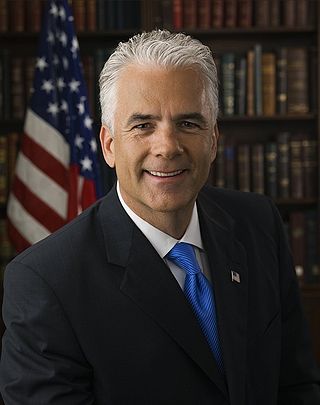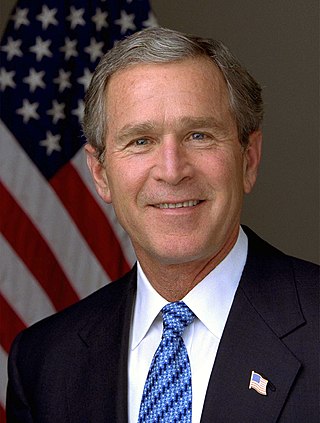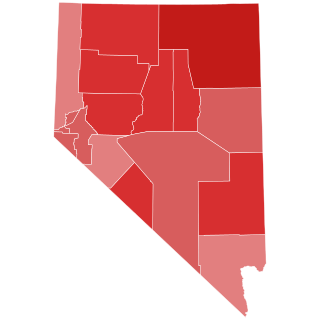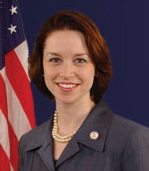
John Eric Ensign is an American veterinarian and former politician who served as a United States Senator from Nevada from 2001 until his resignation in 2011 amid a Senate Ethics Committee investigation into his attempts to hide an extramarital affair. A member of the Republican Party, Ensign previously represented Nevada's 1st congressional district in the House of Representatives from 1995 to 1999. Following his resignation from the Senate, Ensign returned to Nevada and resumed his career as a veterinarian.

Harry Mason Reid Jr. was an American lawyer and politician who served as a United States senator from Nevada from 1987 to 2017. He led the Senate Democratic Caucus from 2005 to 2017 and was the Senate Majority Leader from 2007 to 2015.

The 2004 United States Senate elections were held on November 2, 2004, with all Class 3 Senate seats being contested. They coincided with the re-election of George W. Bush as president and the United States House elections, as well as many state and local elections. Senators who were elected in 1998, known as Senate Class 3, were seeking re-election or retiring in 2004.

Rochelle "Shelley" Berkley is an American businesswoman, politician and attorney who served as the U.S. Representative for Nevada's 1st congressional district from 1999 to 2013. In 2012, she was the unsuccessful Democratic Party nominee for the U.S. Senate. She is a member of the Democratic Party, and is currently running in the 2024 Las Vegas mayoral election.

The 2002 United States Senate elections featured a series of fiercely contested elections that resulted in a victory for the Republican Party, which gained two seats and thus a narrow majority from the Democratic Party in the United States Senate. The Senate seats up for election, known as class 2 Senate seats, were last up for regular election in 1996. The election cycle was held on November 5, 2002, almost fourteen months after the September 11, 2001 attacks.

John Randolph Thune is an American politician serving as the senior United States senator from South Dakota, a seat he has held since 2005. Thune is in his fourth Senate term and is the Senate minority whip, a post he has held since 2021. A member of the Republican Party, Thune served three terms as the U.S. representative for South Dakota's at-large congressional district from 1997 to 2003.

The 1998 United States Senate elections were held on November 3, with the 34 seats of Class 3 contested in regular elections. This was seen as an even contest between the Republican Party and Democratic Party. While the Democrats had to defend more seats up for election, Republican attacks on the morality of President Bill Clinton failed to connect with voters and anticipated Republican gains did not materialize. The Republicans picked up open seats in Ohio and Kentucky and narrowly defeated Democratic incumbent Carol Moseley Braun, but these were cancelled out by the Democrats' gain of an open seat in Indiana and defeats of Republican Senators Al D'Amato and Lauch Faircloth. The balance of the Senate remained unchanged at 55–45 in favor of the Republicans.

The 1976 United States Senate elections was an election for the United States Senate. Held on November 2, the 33 seats of Class 1 were contested in regular elections. They coincided with Democrat Jimmy Carter's presidential election and the United States Bicentennial celebration. Although almost half of the seats decided in this election changed parties, Carter's narrow victory did not provide coattails for the Democratic Party. Each party flipped seven Senate seats, although, one of the seats flipped by Democrats was previously held by a Conservative.

The 2010 United States Senate elections were held on November 2, 2010, from among the United States Senate's 100 seats. A special election was held on January 19, 2010, for a mid-term vacancy in Massachusetts. Thirty-four of the November elections were for six-year terms to the Senate's Class 3, while other three were special elections to finish incomplete terms. Those 37 November elections featured 19 incumbent Democrats and 18 incumbent Republicans.

The 2006 United States Senate election in Nevada was held on November 7, 2006. Incumbent Republican John Ensign defeated Democratic nominee Jack Carter to win re-election to a second term. This election was the only Senate election in Nevada where the incumbent Republican Senator was re-elected or won re-election since 1980 and the only Senate election in Nevada for this seat where the incumbent Republican Senator was re-elected or won re-election since 1952.

The 2004 United States presidential election in South Dakota took place on November 2, 2004, and was part of the 2004 United States presidential election. Voters chose three representatives, or electors to the Electoral College, who voted for president and vice president.

The 2002 United States Senate election in South Dakota was held on November 5, 2002. Incumbent Democratic U.S. Senator Tim Johnson narrowly won re-election to a second term over Republican John Thune by a margin of 524 votes, or 0.15%. This made the election the closest race of the 2002 Senate election cycle.

The 2004 United States Senate election in South Dakota was held on November 2, 2004. Incumbent Democratic U.S. Senator and Senate Minority Leader Tom Daschle ran for re-election to a fourth term, but was narrowly defeated by Republican John Thune.

The 2010 United States Senate election in Nevada took place on November 2, 2010. Incumbent Democratic U.S. Senator and Majority Leader Harry Reid won re-election to a fifth and final term.

See also: 2012 United States Senate elections

The 2000 United States Senate election in Nevada was held on November 7, 2000. Incumbent Democrat Richard Bryan decided to retire instead of seeking a third term. Republican nominee John Ensign won the open seat. John Ensign defeated Ed Bernstein in a landslide despite George Walker Bush carrying the state by a very narrow margin in the concurrent presidential election in the state.

Elections were held in Nevada on November 2, 2010, for one seat in the U.S. Senate, three seats in the U.S. House of Representatives, the office of Governor of Nevada, and other state and local officials. Primary elections took place on June 8, 2010.

The 2002 United States House of Representatives election in South Dakota took place on Tuesday, November 5, 2002. Voters selected a representative for their single At-Large district, who ran on a statewide ballot.

The 2014 Nevada gubernatorial election was held on Tuesday, November 4, 2014, to elect the Governor of Nevada. Incumbent Republican governor Brian Sandoval won re-election to a second term in office, defeating Democratic nominee Bob Goodman in a landslide. Sandoval won a higher percentage of the vote than any other incumbent governor in 2014.

The 2018 United States House of Representatives elections in Nevada were held on November 6, 2018, to elect the four U.S. representatives from the State of Nevada, one from each of the state's four congressional districts. The elections coincided with the Nevada gubernatorial election, as well as other elections to the United States House of Representatives, elections to the United States Senate and various state and local elections. Primary elections were held on June 12, 2018.























